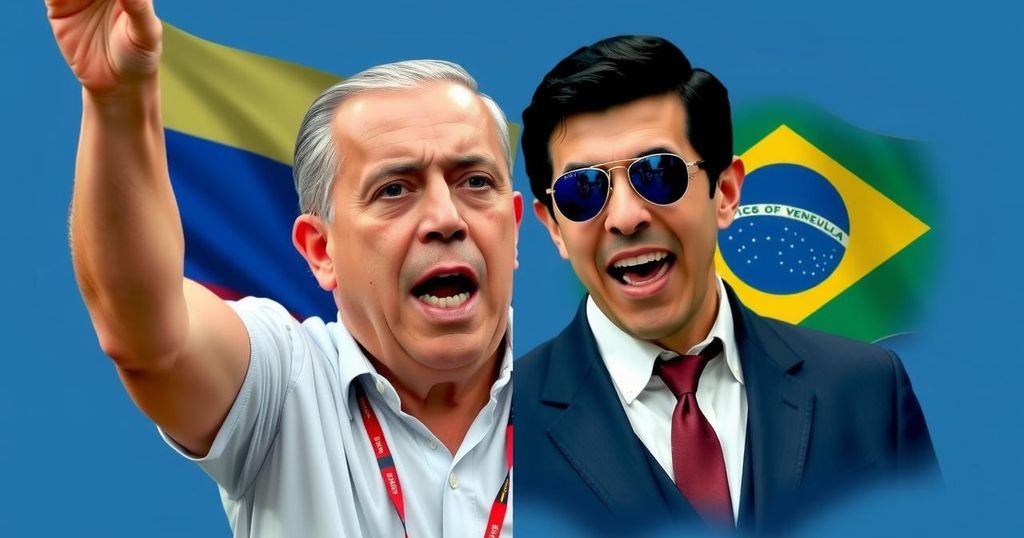Six Venezuelan opposition figures sheltering in the former Argentine embassy in Caracas are facing escalating harassment, prompting Argentina, Brazil, and the OAS to call for their safe passage. The situation arises from a disputed presidential election, intensifying political instability, and questioning of human rights by Maduro’s government, which continues to dismiss external pressure.
In Caracas, Venezuela, six opposition figures are facing increasing harassment while seeking refuge in the former Argentine embassy. Their living conditions have deteriorated significantly due to surveillance, utility disruptions, and recent arrests of local staff. This situation stems from the aftermath of a disputed presidential election held in July 2024, which both Nicolás Maduro and opposition leader María Corina Machado claim to have won. Amidst rising tensions, Argentina, Brazil, and the Organization of American States (OAS) are pressing for the safe passage of the opposition members, yet Maduro’s government continues to resist such international efforts.
Since March, these six individuals, including campaign manager Magalli Meda for Machado, fled to the diplomatic compound in response to threats against them for their political beliefs. Initially under Argentina’s protection, the authority was handed over to Brazil in August. However, complications arose when Maduro revoked Brazil’s oversight in September, further exacerbating the crisis. Meda spoke about their dire conditions in a recent conference, highlighting the psychological and physical repression they are currently experiencing.
Venezuelan government officials, led by Interior Minister Diosdado Cabello, have dismissed the allegations as unfounded claims, portraying the opposition’s narratives as public relations attempts. This backdrop of escalating harassment aligns with the political chaos ignited by the controversial results of the July 28 election. The National Electoral Council, perceived as aligned with Maduro, called him the victor without offering substantive evidence, whereas the opposition contends that their candidate, Edmundo González, received significantly more votes.
In light of these events, Argentina and Brazil have actively called for international intervention. Argentina has urged the OAS to apply diplomatic pressure on Venezuela, gaining support from numerous OAS member states for the safe exit of the opposition figures. Brazilian President Luiz Inácio Lula da Silva is working on broader political discussions, even in the face of Maduro’s dismissal of Brazil’s authority over the compound. The Brazilian ambassador at the OAS emphasized that international law must be upheld, reminding parties that embassies are considered inviolable and should be afforded protection.
The compound where the opposition members are sheltering is a focus of international scrutiny, as actions by Venezuelan authorities, including cutting utilities and surrounding the area with armed guards, raise serious concerns about their compliance with international legal standards. The diplomatic crisis highlights a growing rift in the relationships Venezuela maintains within the region, as many countries continue to criticize Maduro’s approach to dissent, further isolating his government.
Pedro Urruchurtu, one of the sheltered opposition members, urged regional governments to intensify their efforts to avert a worsening crisis. He articulated the urgency in taking collective action to protect the individuals who face dire circumstances daily, underscoring the human cost tied to the ongoing political unrest.
The pressing need for an immediate solution to the situation of these six opposition figures is indicative of the larger challenges within Venezuela’s political landscape. The opposition’s call for international support remains steadfast, while the Maduro administration persists in dismissing claims and consolidating its authority amid growing dissent. The current standoff thus underscores the critical need for coordinated international action to ensure the safety and rights of those opposing Maduro’s regime.
The current Venezuelan political crisis has intensified following a disputed presidential election held on July 28, 2024. Both Nicolás Maduro and María Corina Machado claim victory, resulting in a deep political divide in the country. Six opposition members have sought refuge in the former Argentine embassy in Caracas, where they face harassment, surveillance, and power outages, prompting concerns about their safety and basic human rights. International response primarily from Argentina, Brazil, and the Organization of American States (OAS) seeks to pressure Maduro’s government to ensure the safe passage of these opposition figures.
The plight of the six Venezuelan opposition figures sheltering in the former Argentine embassy signals a broader struggle for democracy in Venezuela. As their rights are increasingly undermined by the Maduro government, international advocacy becomes paramount in securing their safe exit from the country. The tension surrounding this situation not only highlights the urgent need for regional cooperation but also emphasizes the broader implications of Venezuela’s political turmoil on international relations and human rights.
Original Source: www.newslooks.com






